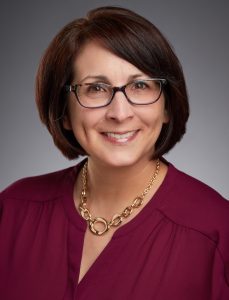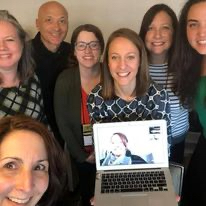MT Advocacy: Make a Real Impact
 In reality, a music therapist’s daily work is the strongest advocacy tool for spreading the word about music therapy. At the same time, every MT-BC can more purposefully contribute to the critical task of increasing the strength and frequency of advocacy efforts for our profession in keeping with the mission of AMTA – “to advance public awareness of the benefits of music therapy and increase access to quality music therapy services in a rapidly changing world.” In this AMTA-Pro podcast, our colleague Leslie Henry, co-chair of AMTA’s Professional Advocacy group, shares a wealth of helpful advocacy guidelines based on her own experiences as well as some years of working with MT-BCs around the country. Leslie leads listeners through an exploration of their own networks and how to tend these networks, approaches that can be used based on the timing of the idea you are advocating for, and time-tested tips on being persuasive in different situations. The text notes for this AMTA-Pro podcast include valuable guidelines and resources,
In reality, a music therapist’s daily work is the strongest advocacy tool for spreading the word about music therapy. At the same time, every MT-BC can more purposefully contribute to the critical task of increasing the strength and frequency of advocacy efforts for our profession in keeping with the mission of AMTA – “to advance public awareness of the benefits of music therapy and increase access to quality music therapy services in a rapidly changing world.” In this AMTA-Pro podcast, our colleague Leslie Henry, co-chair of AMTA’s Professional Advocacy group, shares a wealth of helpful advocacy guidelines based on her own experiences as well as some years of working with MT-BCs around the country. Leslie leads listeners through an exploration of their own networks and how to tend these networks, approaches that can be used based on the timing of the idea you are advocating for, and time-tested tips on being persuasive in different situations. The text notes for this AMTA-Pro podcast include valuable guidelines and resources,

MT Advocacy: Make a Real Impact
AMTA-Pro Podcast + November 2020
Leslie Henry, MM, MT-BC
— + —
 Music therapists educate and network with a variety of diverse groups of people about our profession, whether formally or informally. How we communicate with others really does matter and can carry great impact. This AMTA-pro podcast leads listeners through an exploration of their own networks and how to tend these networks, approaches that can be used based on the timing of the idea being advocated for, and time-tested tips on being persuasive in different situations.. In this picture, the podcast speaker, Leslie Henry, is taking a “group selfie” at the 2018 National AMTA Conference with other regional representatives on the AMTA Professional Advocacy Committee (l to r) Leslie Henry, Tracy Wanamaker, Kalani Das, Rebecca McCoy, Emily Bevelaqua, Kelli McKee, and Sharon Graham.
Music therapists educate and network with a variety of diverse groups of people about our profession, whether formally or informally. How we communicate with others really does matter and can carry great impact. This AMTA-pro podcast leads listeners through an exploration of their own networks and how to tend these networks, approaches that can be used based on the timing of the idea being advocated for, and time-tested tips on being persuasive in different situations.. In this picture, the podcast speaker, Leslie Henry, is taking a “group selfie” at the 2018 National AMTA Conference with other regional representatives on the AMTA Professional Advocacy Committee (l to r) Leslie Henry, Tracy Wanamaker, Kalani Das, Rebecca McCoy, Emily Bevelaqua, Kelli McKee, and Sharon Graham.
1. Identify your current networks and your potential networks
● Colleagues
● Legislators
● Clients & Their Families
● Our Mom (family & friends too)
● Community groups we are part of
● Agencies & Institutions
● People who have not met us yet
2. Find Your Champions & Form Alliances.
● Ideas gain credibility.
● Influencers have power.
● A converted person may become a compelling advocate.
● Networks attract resources.
● Providing a favor makes it likely you will receive one.
3. Recognize the importance of timing and opportunity.
● Kairos – opportune time = our time to make a move
● Align timing with the present need or a problem.
● Tie ideas to the strength of an organization or the audience.
● Recognize when to avoid new ideas.
● Every new connection expands the market.
4. Take advantage of good times for a new idea or ask.
● Contribution to profit line
● Systems improvement
● Enhanced patient experience
● There is a crisis, how can your idea improve the crisis?
5. Keep persuasion essentials in mind.
● Trustworthiness
● Common ground
● Vivid language
● Compelling evidence
● Emotional connection
● Clarify misunderstandings and misrepresentation of ideas
6. Plan your message: Simple is Better
● Relationship of therapist, client, and music
● What are patient needs, values, and preferences?
● What is definition of MT?
● What is the research?
● What are potential populations?
● Where can you find a music therapist ?
● What is training of MT-BC?
7. Begin with a great story: You are an expert.
● Spin an idea and using it to your advantage.
● We are a part of of something bigger than we know.
For more information, contact:
Leslie Henry, MM, MT-BC
Alverno College Music Therapy Program Director
Co-Chair of the Professional Advocacy Committee
leslie.henry@alverno.edu
414-382-6135
Resources
Chester, John (Director). (2018). The Biggest Little Farm [Film]. United States. FarmLore Films.
Daly, J. A. (2011). Advocacy: Championing ideas and influencing others. Yale University Press.
Gonzalez, J. (2013). Find your marigold: The one essential role for new teachers. Retrieved from: https://www.cultofpedagogy.com/marigolds/
About the AMTA-Pro Speaker
 Leslie Henry, serves as the current Director and Assistant Professor of Music Therapy at Alverno College. She has experience in behavioral health, hospice, intergenerational day care, physical rehabilitation, and Autism. Leslie holds a Bachelor of Music in Music Therapy from Alverno College and a Master of Music from Colorado State University. A proclaimed advocacy devotee, Leslie has served as the co-chair to the Professional Advocacy Committee for the American Music Therapy Association since 2015. During her professional career she has held offices as Vice President and President of the Wisconsin Chapter for Music Therapy, GLR Representative to the Professional Advocacy Committee from 2009 to 2015, served as co-chair for the 1999 and 2005 GLR conferences, and was the 2016 Wisconsin Chapter for Music Therapy Music Therapist of the Year. Leslie has helped train many interns and practicum students in a variety of settings. She is an enthusiastic advocate and freely shares her love of music therapy with others.
Leslie Henry, serves as the current Director and Assistant Professor of Music Therapy at Alverno College. She has experience in behavioral health, hospice, intergenerational day care, physical rehabilitation, and Autism. Leslie holds a Bachelor of Music in Music Therapy from Alverno College and a Master of Music from Colorado State University. A proclaimed advocacy devotee, Leslie has served as the co-chair to the Professional Advocacy Committee for the American Music Therapy Association since 2015. During her professional career she has held offices as Vice President and President of the Wisconsin Chapter for Music Therapy, GLR Representative to the Professional Advocacy Committee from 2009 to 2015, served as co-chair for the 1999 and 2005 GLR conferences, and was the 2016 Wisconsin Chapter for Music Therapy Music Therapist of the Year. Leslie has helped train many interns and practicum students in a variety of settings. She is an enthusiastic advocate and freely shares her love of music therapy with others.